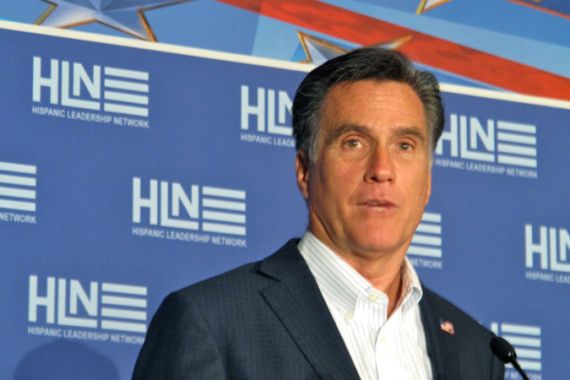Republicans change tune for Hispanic votes
Mitt Romney and Newt Gingrich are softening their stance on immigration issues in an attempt to be more appealing.

 |
| Although Mitt Romney is first in the latest polls, he must secure the hispanic vote to maintain his lead [Al Jazeera] |
Miami, Florida – It is just three days before the crucial Florida Republican primary and former Massachusetts governor Mitt Romney has been wasting no time in trying to woo Hispanic voters.
He has been hitting all the right notes in this important swing state – from promising to support Puerto Rico’s statehood and running Spanish-language TV ads to blasting Cuba’s communist leaders and having his Spanish-speaking son address a gathering of influential Hispanic leaders in Miami.
The latest Quinnipiac University poll shows Romney back in the lead with 38 per cent, nine points ahead of former House Speaker Newt Gingrich. But every vote counts, and with 32 per cent of likely Republican primary voters still saying they might change their mind, analysts say securing the Hispanic vote is paramount.
Hispanics make up 11 per cent of registered Republican voters in Florida and more than 22 per cent of the Sunshine state’s total population. It is the largest and fastest-growing minority group in the US. And failing to reach out to them could be detrimental to the Republican Party, according to former Florida governor Jeb Bush.
“If we ignore the aspirational nature of Hispanic communities across the country,” said Bush ahead of the the presidential debate on Thursday, “conservative candidates will lose”.
Romney seems to be listening. Since the start of his campaigning in Florida he has been aggressively defending himself against accusations by Gingrich that he is anti-immigrant. He says those charges are “repulsive”.
“I like immigration. I like legal immigration,” Romney said at the Hispanic Leadership Network conference in Miami on Friday. “We are not anti-immigrant… We are pro-legality, pro-citizenship nation and party.”
|
“When they were in Iowa, they wanted to hang immigrants… now that they’re here, it’s all nice and gentle.“ – Anthony Suarez, former member of Florida state legislature |
During the debate on Monday in Tampa, he also suggested he would support certain parts of the DREAM (Development, Relief and Education for Alien Minors) Act that would provide undocumented immigrant youth a path to citizenship if they attend college or serve in the US Military.
It is a significant departure for Romney who did not seem to shy away from using much harsher rhetoric earlier in the campaign, when he was addressing audiences in states with smaller Hispanic populations (Iowa, New Hampshire, and South Carolina).
In the past, he called the DREAM Act a “handout that rewards criminal activity by illegals with special benefits”.
That sudden change in tone has not gone unnoticed with Florida’s voters.
Two-faced politicians
“When they were in Iowa, they wanted to hang immigrants,” former member of the Florida state legislature, Anthony Suarez told Al Jazeera. “Now that they’re here, it’s all nice and gentle and they want to talk about grandmothers.”
But there has been little “gentleness” in Romney’s words when it comes to Cuba. On Friday, he promised to do “something” when Fidel Castro “finally leaves this Earth”.
“I will be behind freedom voices here, I will be behind freedom voices there. We will have Cuba become free,” said Romney earning a standing ovation from the audience of mostly Cuban-Americans.
Eduardo Sarasola, an advertising director who lives in Miami but was born in Cuba, says he likes that kind of toughness towards Cuba. He believes president Barack Obama has been too soft on the Castro brothers.
“Why are we so forceful in Libya but not in Cuba? I don’t like that kind of double standard. You are either a hypocrite or your stand up for everybody,” Sarasola said.
Cuban-Americans comprise 32 per cent of eligible Hispanic voters in Florida and the majority of them are registered Republicans. Gail Tenzer, a Brazilian-born realtor, believes Romney’s opposition to higher taxes on the rich resonates especially well with Cuban and Venezuelan-Americans.
“They know what redistribution of wealth means,” Tenzer told Al Jazeera. “They’ve fled from Castro and they’re fleeing from Chavez who wants to expropriate everything. And Romney knows how to push those buttons with them.”
The former Massachusetts governor seems to be striking a chord with Puerto-Ricans as well. On Friday, he said he would support Puerto-Rico becoming the 51st state in the Union, if the territory votes yes in the long-awaited status referendum in August.
Puerto-Ricans can only vote if they live on the mainland although they are citizens of the United States. Many on the island have been campaigning for either fully-fledged statehood or independence.
Elizabeth Cuevas-Neunder, President of the Puerto Rican Chamber of Commerce of Florida, says she felt “relief” and a “weight off her shoulders” when she heard Romney back Puerto-Rico’s statehood. “I think he did his homework and understood how important this issue is for us. I am now definitely voting for him,” she said.
And just hours later, Romney won the endorsement of the governor of Puerto Rico, Luis Fortuno.
Yet experts say it remains unclear if that will boost his chances to win the Hispanic vote in Florida. Puerto Ricans make up 28 per cent of eligible Hispanic voters here. But as well as nation-wide, they have leaned toward Democrats in the past.
This far, polls show the Romney campaign may have a reason to relax. A recent Univision News/ABC poll shows him leading with 40 per cent, 15 points ahead of Gingrich.
Securing the hispanic vote
Experts say that may surprise those who believe Gingrich’s more moderate proposals on legalising undocumented immigrants should appeal to Hispanics nationwide. The former House Speaker wants to grant residency but not citizenship to those undocumented immigrants who have lived in the country for over 20 years, pay taxes and have no criminal record.
But political consultant Carlos Curbelo says Romney’s current lead simply proves leniency toward illegal immigrants does not play as well in Florida as it does in the rest of the country. Cubans have a fast path to citizenship once they reach US shores and Puerto-Ricans are US citizens.
Nonetheless, Gingrich’s supporters say Romney’s lead with Hispanics in Florida will not gain traction nationwide. Adryana Boyne, Director of VOCES Action, from Texas told Al Jazeera getting the “Cubano” vote does not mean Romney will do as well with Mexican-Americans or other Latin Americans, in states such as Texas and California.
And she says Romney is only starting his dialogue with Hispanics, while Gingrich “has been there for us for years”.
“You cannot pander to the Latino vote only during election time,” Boyne said. “You need to have had established a relationship. Newt Gingrich has been building that relationship for years.”
But Romney’s supporters insist Hispanics, like the rest of the country, remain concerned about jobs and the economy, and Romney’s business experience will give him an edge.
Carlos Gutierrez was the US Secretary of Commerce under George W Bush. On Friday, Romney nominated him to sit on his newly-formed National Hispanic Steering Committee.
“We can evaluate campaign styles but in the end: who is going to fix the country? Who is going to fix the economy?” Gutierrez told Al Jazeera. “Who is going to create jobs so that Hispanics can achieve the American dream? That’s what counts and there is no better person than governor Romney.”
The economy indeed appears to be the number one issue. The Univsion News/ABC poll shows that 64 per cent of Hispanic voters in Florida want the government to fix the economy (28 per cent) and create more jobs (36 per cent) .
Experts say that is a reflection of the state of Florida’s economy with a higher than the national average unemployment and plummeting home values.
And yet 43 per cent Florida’s Hispanics also think immigration does matter and must be addressed.
Political analyst Luis Fleischman, professor of Sociology and Political Science at Florida Atlantic University, says a combination of factors will secure the Hispanic vote for Romney in Florida.
“He has succeed in reversing the perception that he is anti-immigrant,” Fleischman told Al Jazeera. “His tough stance on Cuba and Venezuela will also help him. But most will pick Romney because he’s a businessman and everyone in Florida just wants to fix the economy.”